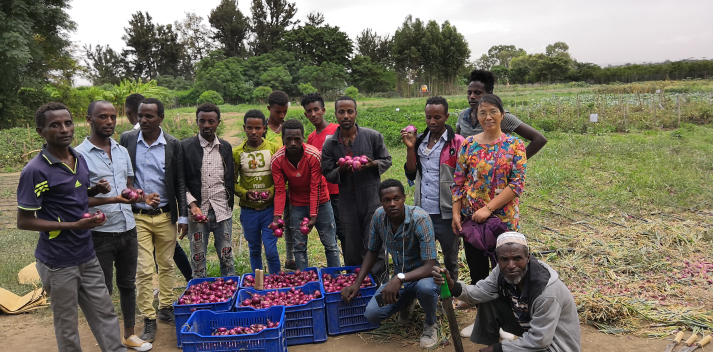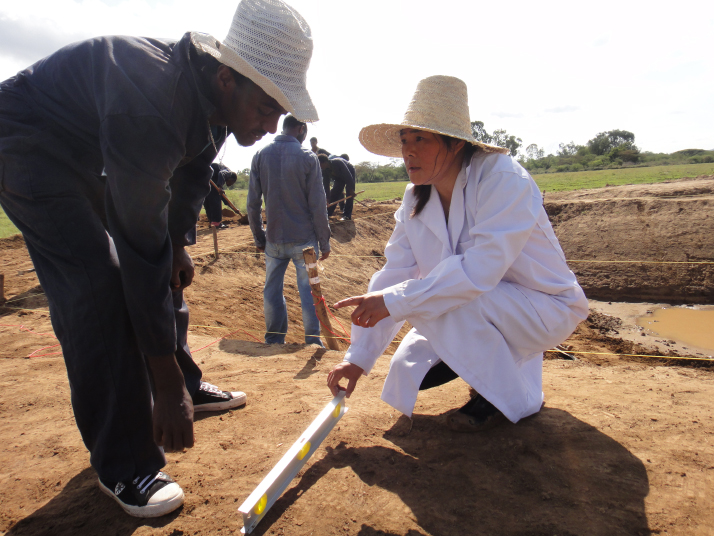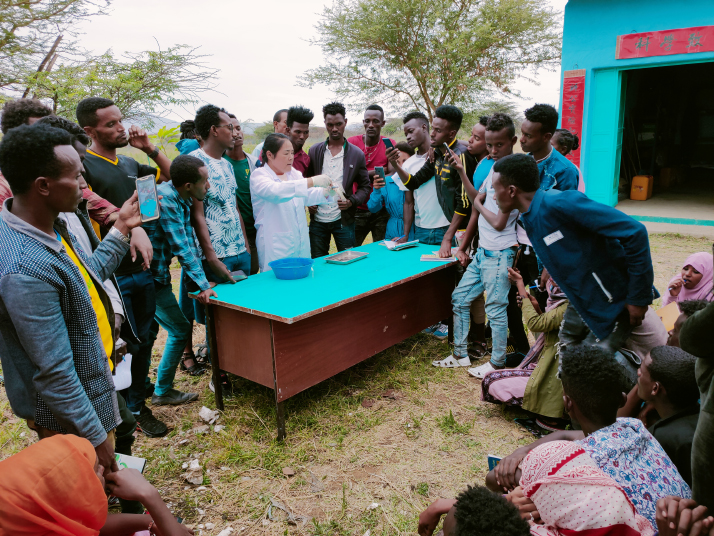|
||||||||||
| Home Nation World Business Opinion Lifestyle ChinAfrica Multimedia Columnists Documents Special Reports |
|
||||||||||
| Home Nation World Business Opinion Lifestyle ChinAfrica Multimedia Columnists Documents Special Reports |
| Agro-cooperation |
| Agricultural cooperation projects play a key role in Sino-African relations |
| With the support of both China and Ethiopia, a total of 485 Chinese agricultural experts have been sent to Ethiopia, to help with the training of agricultural personnel |
| VOL.12 October, 2020 ·2020-10-16 |

There is no denying that agricultural cooperation projects play a key role in Sino-African relations. Among some of the most important and influential projects, the agreement on the exchange of agricultural educational personnel between China and Ethiopia is by far the oldest one. In July 2020, both countries celebrated the 20th anniversary of the implementation of the Sino-Ethiopian Agricultural Technical Vocational Education and Training Project (ATVET Project). With the support of both China and Ethiopia, a total of 485 Chinese agricultural experts have been sent to Ethiopia, to help with the training of agricultural personnel. By doing so, they are laying a solid foundation for the development of vocational education in Ethiopia.
With the support of the Center of International Cooperation Service (CICOS) under the Chinese Ministry of Agriculture and Rural Affairs, one of the main organizations responsible for selecting and sending agricultural experts to Africa, ChinAfrica invited two Chinese experts to share their life experience in Ethiopia.
—Editor

Recollection of My Life in Africa
Zhang Maoqing, 54, participant of the ATVET Project in Ethiopia for a total of 14 years
In the fall of 2002, I set foot in Ethiopia, where I was to begin my career in the field of education in Africa. At that time, we were facing an acute shortage of educational materials. In order to solve this problem as quickly as possible without delaying our educational tasks during the day, I often stayed up until late at night to collect as many educational resources as I possibly could. I had to translate a large number of Chinese university textbooks into English in order to create tailor-made teaching materials for my students.
In addition, more often than not, I had to find a way to prepare specimens of insects and weeds and take pictures of them. I then added the pictures to my textbooks, in order to provide clearer explanations to the learners.
While I was preparing a course on tea processing, I asked my colleagues and friends in China to help me find information and pictures on this topic. Then, I finalized the writing and translation of the textbook content. I was then able to make slides to be shown to the students, again in order to facilitate their understanding. My efforts were well received by both local students and teachers.
With the joint efforts of the Chinese expert group and local Ethiopian teachers, we have managed to write several manuals, covering a number of key topics such as plant protection, herb identification and sample preparation.
Meanwhile, we quickly found out that the local training was mainly focused on theory and was lacking content in terms of field practice. Therefore, we made a point of introducing practical work in the training material. For example, during the writing of the manual on cotton cultivation, we explained in detail all of the specific steps for transplanting and fertilizing cotton. This has greatly improved the field skills of the students.
In addition to my daily teaching tasks, a large part of my time was dedicated to working in the fields. The dry season in Ethiopia lasts from November to March. In order to ensure that water supply is sufficient for crop irrigation, we had to start with a somewhat "manual" method. We had to fetch water ourselves from a dam located about 5 km from the field to be irrigated. It used to take us a whole day just to water the crops. Over the next few years, we built two reservoirs, which solved the irrigation problem.
Time passes quickly. Although I am now back in China, memories of my life in Ethiopia remain deep in my mind. If one day this country needs me again, I would go back there without any hesitation.

Pursuing My Dream in Africa
He Wang, 56, participant of the ATVET Project in Ethiopia for a total of 12 years
Twenty years ago, I had one idea in mind: to discover Africa and use my knowledge to contribute to the development of aquaculture on the African continent. Therefore, in 2003, I left China for Ethiopia, where I worked as an aquaculture expert. My dream came true.
Although Ethiopia has abundant water resources, its aquaculture industry remains less developed. Local fish production is far from meeting domestic demand. As an aquaculture teacher, I started my first assignment at the Holeta ATVET College. In order to help my students to better understand my course, I drew a number of wall charts, which I further explained during my field work with them. In addition, I also built a model of a fish pond to help my students understand in a more intuitive way what I was talking about. Many materials were not available at the time in Ethiopia, so I asked my husband to send some of them from China. During the two years of my mission, I also completed the compilation of the first textbook on the anatomy and physiology of farmed fish, which is still being kept in the library at Holeta ATVET College.
In 2013, I took part again in the ATVET project as a member of the second mission to the Alage ATVET College. As soon as I arrived there, I discovered that there was no field for students to practice what they had learned in class. It is impossible to properly master aquaculture without practicing in the field. So I decided to build a fish pond. I wrote a 16-page project report, detailing the importance of building a pond, including a plan and a budget, and I quickly received the support of local officials.
As the pond was being built, I worked as an organizer, supervisor, teacher, but also as a construction worker. Due to the lack of building materials, we had to bring by ourselves sand and stones from a riverbed located more than 10 km away. We collected water pipes and welding rods from the college's warehouse, and I even asked my family to send us filter cloth. Local technicians had never seen some of the components of the fish pond before, so I drew a diagram of the structure and showed them pictures to make it easier to understand and assemble. After five months of hard work and thanks to the joint efforts of teachers, students and workers, our pond was finally ready.
It was not an easy task, but I am delighted to have been able to contribute to the development of the agricultural industry in Ethiopia. I am honored to see that my work was recognized by local people, and I am proud that I have done something in strengthening Sino-African friendship. Wasn't this the dream I wanted to achieve in the first place?
(Print Edition Title: Unforgettable Memories)
Comments to zanjifang@chinafrica.cn
| About Us | Contact Us | Advertise with Us | Subscribe |
| Copyright Beijing Review All rights reserved 京ICP备08005356号-5 京公网安备110102005860号 |